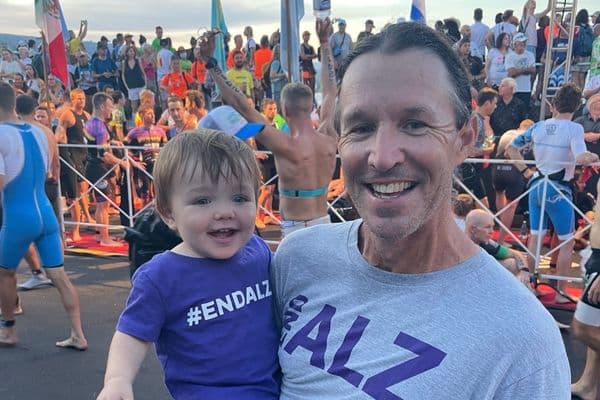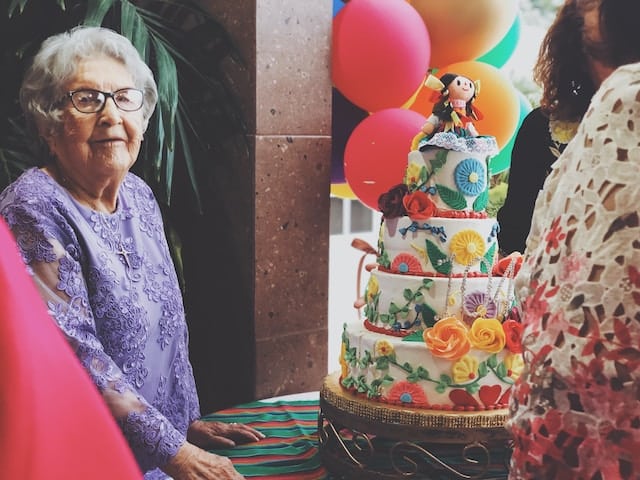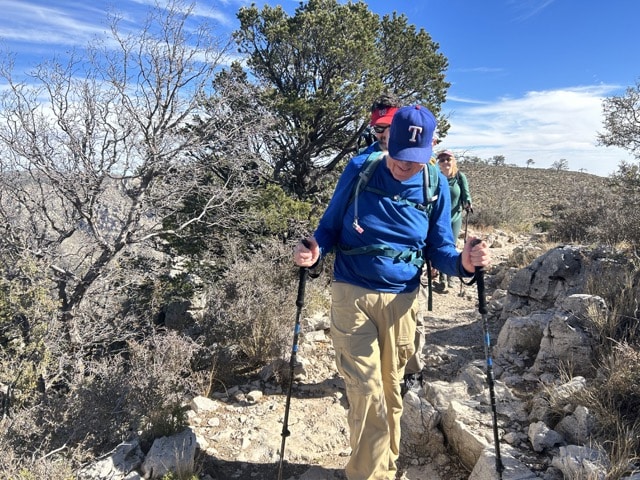What does living your best life with cognitive decline look like? Learn first-hand from four people with stories that inspire.
Receiving a diagnosis of cognitive decline can come with feelings of uncertainty about what the future might hold. Some people wonder how much time they have left, and how best to fill that time. Others wonder if they will still be able to do the things that bring them joy. Here are four individuals for whom a dementia diagnosis ignited a desire to accomplish incredible feats — from taking part in multiple IRONMAN competitions, to running a marathon on every continent.
The Ironman with a long-term plan
Dan Jaworksi always wanted to compete in IRONMAN Kona, the annual world championship of IRONMAN competitions, but after he was diagnosed with mild cognitive impairment at age 54 in 2019, he realized that dream would be much harder to achieve.
But he refused to let an MCI diagnosis stop him from achieving his goal. At age 75, Jaworski did compete in IRONMAN Kona for the first time — and he says it won’t be the last. Jaworski is currently training for the North Carolina IRONMAN 70.3 — a half-IRONMAN triathlon featuring a 1.2-mile swim, 56-mile bike and 13.1-mile run. Jaworski’s wife and son will be participating in the race as well.
“For me, it would be two to three runs a week, two bike rides with one long one in there, like a 50 mile or something like that,” Jaworski said of his training plan. “My goal is to make it to 2040, when [my doctors] say that I will not be on this planet. I’ve invited everybody…to come with me back to Kona in 2040.”
With a lengthy career in finance that stretched into his 50s, Jaworski admits his diagnosis was a shock.
“When I got out of that [cognitive] test, I was like, ‘OK, something is wrong,’ because I’m not able to do some of these things, which I had never figured would happen to me,” Jaworski said.
His advice for anyone who is at risk: “Get out and go run. Movement is medicine. Get your body moving. We all end up in the same place, but you can have a much better life if you do that.”
Climbing higher: The Top of Texas at 71
Don Kent’s journey to diagnosis was a complicated one. In fact, he was misdiagnosed by six different neurologists before learning he has Lewy body dementia. Because of this experience, he’s a passionate advocate for educating others about LBD and what it means to live a fulfilling life with the disease. And he isn’t about to let it stop him from reaching new heights.
At age 71, Kent set his sights on climbing Guadalupe Peak, a mountain in his home state sometimes referred to as the “Top of Texas” for its 8,751-foot summit.
Kent’s entire family, including his wife Cynthia, were initially taken aback by Kent’s determination to do the trek but quickly showed their support. In the six months leading up to the climb, Kent lost 90 pounds in his physical training.
“If he’s gonna get passionate about something, it might as well be living a healthier lifestyle and improving his physical fitness,” Cynthia said. “I [am hopeful] it will help him with his overall condition as well and slow the progression.”
Kent’s two sons, Jarad and Drew, assisted their father on the trek, and at one point had to catch him from falling over the edge of the trail, which can be completely unprotected in some parts, with no railing.
“One thing I would say to people with dementia,” Kent said: “Recognize what you can and can’t do. There are a lot of things I can’t do, and I choose to dwell on what I can do.”
The couple running the distance together
Catherine Elizabeth Popp was working for the Transportation Security Administration when her husband Anthony Copeland-Parker began to notice a change in her behavior.
“I noticed that instead of taking 15 [or] 20 minutes of [doing] a simple task of balancing a checkbook, it took almost all day,” Copeland-Parker said. “When [her] job performance started waning, we wanted to have documentation so that we could protect her. We went to a neurologist, and that’s when [the doctors] were able to go through all the testing and come back with the diagnosis of early-onset Alzheimer’s.”
Popp was 53 years old at the time. The year was 2014.
Alzheimer’s may have changed the way she handles certain tasks, but she didn’t plan to let it keep her from her passions: Both avid runners, she and Copeland-Parker set a goal to run a marathon in each of all 50 states. They achieved that goal in 2020 — and they didn’t stop there.
In 2024, the couple achieved another milestone: running half-marathons in all 50 states. Popp ran 43 of the 50, and Copeland-Parker pushed her in what they call the “CatMobile” — a transportation device that resembles an adult-sized stroller — for the last seven races.
Copeland-Parker details their journeys in his two books, Running All Over the World, Our Race Against Early Onset Alzheimer’s, and One Footstep at a Time: Our Race Against Early-Onset Alzheimer’s Continues.
The duo continues to impress. They’ve set a goal to complete 50 10Ks by Popp’s 65th birthday, which is coming up in May of 2026.
Pedaling past the stigma — on a Penny Farthing bicycle
Peter Berry began experiencing sudden forgetfulness in his late 40s. It took three years from Berry’s first appointment with a physician to receive a diagnosis of early-onset Alzheimer’s, at age 50. A dementia diagnosis can have a profound impact on mental health, and in the months following his diagnosis Berry struggled.
“Because there was no support after the diagnosis, the outcomes associated with the disease weighed heavy on my shoulders. For a good year, I went into a deep depression,” he said. “We decided to keep it very quiet because to be very frank, I felt quite embarrassed. To say, ‘I have Alzheimer’s’ — I was ashamed of it all.”
But gradually, Berry found a way to turn his depression into hope.
“I thought, ‘Hang on, I know what it is like to be here,’” he recalled. “That gave me the encouragement that I needed to think to myself, ‘OK, I have a purpose now: to educate others, help others, and hopefully inspire people to live as well as they can with this condition.”
He turned to his passion for cycling. In 2019, he cycled 350 miles through multiple counties in his home country of England on a penny farthing — a bicycle with a giant front wheel and small back wheel, raising nearly $4,400 for Young Dementia UK. Last June, Berry completed a new challenge — riding 100 miles on a penny farthing in just one day.
His advocacy didn’t stop there: He set out on a mission to help others living with a diagnosis who might be struggling with similar emotions.
Ten years after his initial diagnosis, Berry regularly speaks at hospitals and universities about his experience living with dementia, and he recently delivered talks to students at Essex University and the nursing staff at West Suffolk Hospital.
If you’re interested in hearing more inspirational stories, check out our upcoming Live Talks.




